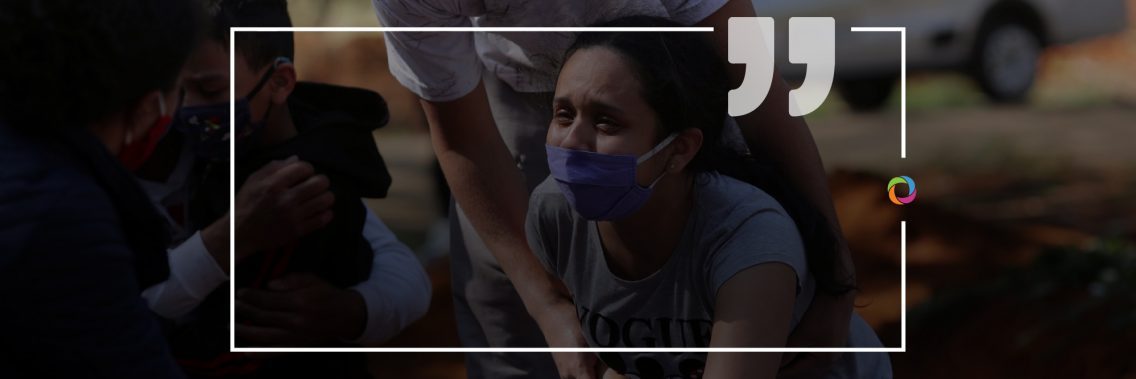The Coronavirus pandemic has become not only a health tragedy, it has also been “the apple of discord” between different opinions and state policies. With Brazilian President, Jair Bolsonaro, railing against lockdowns and asking his citizens to ignore social distancing measures, it has been left to community organizations, local officials and private donors to take the lead in responding to COVID-19 in Brazil. Take a few minutes to check out the opinions of some global health experts regarding this subject.
What could be the long-term consequences of Brazil’s approach to Coronavirus?

“Failure on the part of the government to lead the prevention of and response to COVID-19 could result in an uncontrolled increase in the number of infected persons being recorded in Brazil as the transmission of the coronavirus undergoes exponential circulation. This also confirms that neglecting one new case now has severe repercussions on the number of cases in the near future because preventing the spread of one case of the virus today contributes to the avoidance of four new cases in the future. The economic burden of responding to the virus during the early stage of transmission is far less than the cost to the country when the number of cases increases. As time passes by, it will cost Brazil much more in economic terms to respond to or eradicate the virus. In addition, previous studies conducted on the long-term effects of Severe Acute Respiratory Syndrome (SARS) revealed that individuals who suffer from acute respiratory distress syndrome (which is often observed in critical cases of COVID-19) occasionally progress to long-term lung damage or fibrosis. This has a negative effect on the life expectancy of individuals infected with the virus which also results in a ripple effect. For instance, the country may experience an increased in mortality rates and an increase in morbidity from COVID-19 would conversely lead to a decrease in productivity in the marketplace.”

“A Lack of support, a non-existent Government response, the absence of a real Health Minister, the dissemination of fake news and a failure to achieve a 70% social distancing rate has resulted in a dramatic distortion of the “curve flattening” concept. Since 19th May, around 1000 Brazilian lives have been lost every day due to COVID-19. These lives have a color and an address: most of them are black, live in poor areas and cannot afford to follow social distancing measures or work remotely. With the unemployment rate hitting a new record high (more than 12 million Brazilians are unemployed today), when faced with the decision of either dying of hunger or potentially dying of COVID-19, the choice is clear. People have resumed their lives, accepting these 1000 daily deaths as being the new normal. The long-term consequences of this normalization are multiple. From a health view point, Brazil cannot expect to see the end of this first COVID wave any time soon which explains why state governors are already buying potential vaccines (even without scientific proof that they will offer long-term immunity). Socio-economically speaking, the COVID-19 crisis has simply confirmed and intensified Brazil’s economic inequality, putting even more strain on an already poor and fragile population. Politically, given the lack of response and the utter neglect with which the Bolsonaro Administration has dealt with the pandemic, this long-term plateau can serve as a platform for even more fake-news campaigns, proving his tragically self-fulfilling prophecy that social distancing measures would not help save Brazilian lives.”

“Beyond the socio-economic, educational and environmental consequences, the Coronavirus crisis will have dramatic consequences on the population’s health in the long term. In May, Brazil became one of the epicenters of the COVID-19 outbreak, with the world’s second-highest number of deaths. In August, Brazil, with a population of over 200 million, has more than 3 million cases and has suffered upward of 100,000 deaths with an average of 1,000 loss of lives a day. No region of Brazil is immune to the virus. Overloaded health structures and the fear of catching the virus, have forced people to stay at home and risk dying there from treatable infections. Since Jair Bolsonaro promoted the use of hydroxychloroquine as the solution to the crisis, we can expect a self-medication approach from the population. We can also anticipate consequences on the population’s mental health due to the fear of catching the virus, the trauma of having lived and survived it and the suffering of having lost a loved one to it. Even with recent R$ 3 billion support in personal protective equipment, ventilators and other hospital equipment, the congested health system may collapse, across the whole country, and particularly in remote regions with weak health infrastructures. Brazil’s health system, after covid-19 and Jair Bolsonaro will never be the same.”

Senior project manager – Global Health
“In the last decades, Brazil strongly improved the health status of its populations and implemented many public policies including in the health sector that were an example for the world. The country was recognized as a strong player in the international arena, raising the voice of low- and middle-income countries (LMIC) in different international organizations and forums. Many Brazilians are not even aware of the strong position that their country had in the world. The current approach of the Brazilian national government to the Covid-19 is not only responsible for the mismanagement of the epidemic that killed almost 120.000 people by 31st of August in the country – with all economic losses and pains related -, but is also jeopardizing Brazil`s international position and leadership. It may have not only a direct consequence for the country in the diplomatic, business and trade fields, but the LMIC-community may be losing a former strong advocate for their interests and an example of democracy and good governance in public health.”
What are some lessons we should learn from Brazil’s “fight” against COVID-19?

“Lessons learnt are that early detection and prevention are an essential part of disease planning and preparedness; a pre-emptive approach is critical to containing the spread of infectious disease with a high transmissivity such as COVID-19; isolation, social distancing and border controls are key urgent actions needed to be employed to avert the spread of the virus; the failure to adequately communicate to the public the severity of the disease has the tendency to impede the struggle against COVID-19.”

Senior project manager – Global Health
“Brazil is not disbursing funds fast and enough for the pandemic control; health staff is not receiving adequate support; surveillance and case tracing are not reliable and even lacked transparency; and some authorities are suggesting treatments with no confirmed effectiveness, giving a false sense of safety to the public. Yet, the largest mismanagement is that until now no coordinated response among the different administrative levels steered by the national government exists, not even a national strategy plan. The messages regarding the pandemic are conflictive, and a culture of blaming is damaging the public discourse. This political failure is not only causing deaths, pains, and economic losses but deepening the divides between groups, increasing the mistrust in science and public health authorities. Other countries may learn from the Brazilian experience and take the outbreak control more seriously, launching or strengthening policies based on scientific knowledge. Besides, we may also learn that developments achieved cannot be taken for granted and we should always reinforce and keep an attitude of continues improvement, including in public health issues. ”

“Governments should be prepared for future pandemics, should invest in research, healthcare resources and medical equipment, value healthcare workers, educate their population on the importance of basic distancing manners, aim to support companies that might otherwise be forced to close their doors and, lastly, protect the most vulnerable on a daily basis. Despite the tragic state of affairs, there are still positive lessons to be learned, most notably with regard to the resilience of sub-national governments and citizens themselves. When left to their own devices, communities can find the power to mobilize resources and use their creativity to solve local problems. For example, among São Paulo’s poorest communities in the Paraisópolis neighbourhood one of the most effective community organizations has merged to care of the population and fight the spread of the pandemic. 400 “street presidents” organize daily efforts to monitor and help the sick and support families experiencing financial difficulties.”

“The repeated contradictions between President Bolsonaro and most other public authorities, created a confusion among the population, who did not enough respect the necessary measures, impeding the control of the epidemic. In early March, Brazil Minister of Health declared a public health emergency, while Bolsonaro named it ‘small flue’. From the outset, thirty preventive and supportive measures were stated in all sectors (health, education, employment, business, social services as the “emergency aid” for up to 65,9 million beneficiaries), similar to those in Europe, combining hygiene measures, closure of business and the confinement of the population across the country. But these measures did not bring the same results as in other countries, because they were only partially followed. President Bolsonaro himself dismissed the risk posed by the virus, sabotaged quarantine measures adopted at the state level and called on Brazilians to continue working to keep the economy from collapsing. His believers did the same: many businesses did not close, and many people continued to go to work because they were not sure about the government’s engagement to provide emergency aid.”
What should the international community do to offer more help to Brazil?

“Effective measures that are not expensive are possible if they are well-coordinated. This can be achieved by the following: the international community can play a part in the mobilisation of funds to facilitate the process involved in the coordination and implementation of response plans for the fight against COVID-19; the launch of public awareness and sensitization campaigns on how citizens can protect themselves and others from COVID-19; funding and supporting short-term and emergency response research to enhance knowledge about COVID-19; coordinating the sharing of information and data among various stakeholders. The international community should have full control of charity programs, contributing directly to local organisations in low-income communities and donating funds to cover supply shortages in the country’s free universal healthcare system.”

“In general, it would be good to see even more strict control on fake-news from key opinion and political leaders. This would prevent the government from inflicting so much damage when it comes to communication (or a lack thereof) of scientific-based issues to the majority of the population. A clear example where international leaders and key opinion makers could help is the delegitimizing of Bolsonaro’s attempts to promote hydroxychloroquine as a treatment for COVID-19 without any scientific backing. His advice and recommendations are not just preventing people from taking the necessary precautions – they may be adding to the death toll. But more operationally, the international community (whether it is governments, foundations or NGOs) can help Brazilian local communities to fight COVID-19 locally, bypassing the government and injecting funds and in-kind support directly into the community efforts being set up throughout the country to help those in most need.

“The international community, including international humanitarian and development organizations, find themselves in the typical dilemma of ethics versus diplomacy: Should ethics prevail, the international community would intervene, at the risk of being criticized for not respecting Brazil’s independence and sovereignty; or should diplomacy prevail, at the risk of an increased number of deaths. Considering the size of the pandemic crisis and the president’s necro politics, the international community should assist Brazilians in their fight against the pandemic and its socio-economic consequences at all levels (from national government down to local communities), in all domains (medical, education, environmental, financial, economics, etc.) and through different approaches (financial support, humanitarian aid, community-based mobilization, etc).”

Senior project manager – Global Health
“Brazil is a wonderful country with engaged and enthusiastic people. It has strong technical capacities in the health sector; has competent organizations committed to public health improvement as FioCruz – Oswaldo Cruz Foundation or “ABRASCO” – Brazilian Association of Collective Health; a community health program and a universal health system – “SUS” – that were created to ensure full, universal and free access of health services for the entire population. These people and organizations need global support to better implement evidence-based strategies and policies. Besides, especially vulnerable population groups as indigenous and low-income population need strong advocates worldwide. Diplomatic action and pressure from international organizations at the Brazilian authorities for a change in the current approach to the pandemic is needed, as the disease is not only causing large-scale loss of life in Brazil, but it is a hot spot from where the virus can spread to neighboring countries and other parts of the world. My opinions can be also found here and here.”
Check out more than 600 job opportunities in the health sector here.

